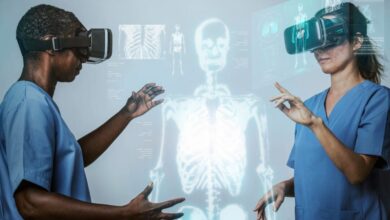Personalized Medicine And Genomics The Tech Behind Tailored Treatment

Personalized Medicine and Genomics: The Tech Behind Tailored Treatment – Personalized Medicine and Genomics The Tech Behind Tailored Treatment sets the stage for this enthralling narrative, offering readers a glimpse into a story that is rich in detail and brimming with originality from the outset. This innovative approach revolutionizes healthcare by leveraging an individual’s unique genetic makeup to tailor treatments specifically suited to them, surpassing traditional one-size-fits-all methods. By understanding the complexities of genomics, healthcare providers can now develop more effective and targeted therapies that improve patient outcomes and enhance the overall quality of care.
Introduction to Personalized Medicine and Genomics

Personalized medicine is revolutionizing healthcare by tailoring medical treatment to the individual characteristics of each patient. This innovative approach goes beyond the traditional “one-size-fits-all” model, focusing on the unique genetic makeup, lifestyle, and environment of each person. By considering these factors, personalized medicine aims to enhance treatment efficacy, reduce adverse effects, and ultimately improve patient outcomes.
Genomics plays a pivotal role in this paradigm shift, serving as the foundation for developing tailored treatments. By analyzing an individual’s DNA, healthcare providers can gain insights into how their body processes medications and what specific therapies may work best. This genomic information allows for more precise diagnoses and treatment plans that are custom-fitted to the patient’s genetic profile, leading to more effective and targeted interventions.
Distinction from Traditional Treatment Approaches
The fundamental difference between personalized medicine and conventional treatment lies in the level of customization offered. Traditional approaches typically rely on generalized guidelines that apply to a broad population, often leading to variability in treatment outcomes. In contrast, personalized medicine utilizes a detailed understanding of genetic information and other relevant factors to create a more tailored therapeutic strategy.
Factors that illustrate this distinction include:
- Genetic Variability: Personalized medicine considers genetic differences that affect drug metabolism and response. For example, variations in the CYP2D6 gene can influence how individuals metabolize certain antidepressants, leading to adjusted dosages and improved efficacy.
- Targeted Therapies: Conditions like certain cancers can be treated with targeted therapies based on genetic profiling. For instance, breast cancer patients with HER2-positive tumors may benefit from trastuzumab (Herceptin), a treatment specifically designed to target this genetic marker.
- Preventive Strategies: Genomics can reveal predispositions to various diseases, allowing for proactive measures. For instance, individuals identified as having BRCA1 mutations can undergo regular screenings or preventive surgeries to mitigate cancer risks.
- Enhanced Patient Engagement: Personalized medicine encourages patients to be active participants in their healthcare. Understanding their genetic makeup fosters more informed discussions about treatment options and lifestyle choices.
Personalized medicine represents a significant advancement in healthcare, moving towards an individualized approach that enhances treatment outcomes and patient experiences.
The Science of Genomics
Genomics is the study of the complete set of DNA, including all of its genes, and it plays a crucial role in understanding human health. By analyzing genomes, researchers can uncover the genetic factors that contribute to health and disease, paving the way for more personalized and effective treatment options. As we delve into the intricacies of genomics, we uncover the foundational concepts that highlight its importance in modern medicine.
Genomic sequencing serves as the cornerstone of personalized medicine, allowing for the detailed analysis of an individual’s genetic makeup. This process involves determining the exact sequence of nucleotides in a given DNA segment, enabling healthcare providers to identify genetic variants that may influence a patient’s health. The application of genomic sequencing extends to various aspects of personalized medicine, including drug development, treatment selection, and disease prevention strategies.
Types of Genetic Variants
Understanding the various types of genetic variants is essential for grasping their implications on health. Genetic variants can be classified into several categories based on their effects on genes and the corresponding proteins. Below are key types of genetic variants with their health implications:
- Single Nucleotide Polymorphisms (SNPs): These are the most common type of genetic variation, occurring when a single nucleotide in the DNA sequence is altered. SNPs can influence how individuals respond to drugs, their susceptibility to diseases, and even their physical traits.
- Insertions and Deletions (Indels): These variants involve the addition (insertion) or loss (deletion) of small DNA segments. Indels can disrupt gene function and can be linked to various genetic disorders, such as cystic fibrosis.
- Copy Number Variants (CNVs): CNVs involve the duplication or deletion of large segments of DNA. These variants can affect gene dosage and are associated with various conditions, including autism spectrum disorders and certain cancers.
- Structural Variants: These include large-scale changes in the genome, such as inversions or translocations of DNA segments. Structural variants can have significant impacts on gene expression and are often implicated in complex diseases.
Genetic variants not only contribute to our understanding of inherited conditions but also inform clinical decisions in personalized medicine. For example, specific SNPs have been linked to differences in drug metabolism, meaning that two patients with the same condition may require different dosages or types of medications based on their unique genetic profiles.
“Genomics is not just about looking at the genes; it’s about understanding the intricate interactions between genes and the environment that shape our health.”
The field of genomics continues to evolve, contributing invaluable insights into the mechanisms underlying human health and disease. As our understanding deepens, the potential for tailored treatment strategies becomes increasingly feasible, revolutionizing the landscape of healthcare.
Technologies Driving Personalized Medicine: Personalized Medicine And Genomics: The Tech Behind Tailored Treatment
The field of personalized medicine is significantly influenced by advanced technologies that enable tailored treatment options for patients. As research continues to evolve, these tools not only enhance our understanding of complex diseases but also pave the way for innovative therapeutic strategies. Key technologies shaping this landscape include CRISPR, Next-Generation Sequencing (NGS), and bioinformatics, each playing a vital role in the development of personalized medicine.
Next-Generation Sequencing (NGS) allows for rapid sequencing of entire genomes, revealing genetic variations that can inform treatment decisions. CRISPR technology offers precise gene editing capabilities, enabling researchers to modify specific genes associated with diseases. Bioinformatics integrates these large volumes of genomic data, providing insights and predictive analytics essential for precision medicine. Understanding the advantages and limitations of these technologies is crucial for their effective application in clinical settings.
Key Technologies Overview
The following table Artikels the major technologies contributing to personalized medicine, highlighting their applications and outcomes:
| Technology | Applications | Outcomes |
|---|---|---|
| CRISPR | Gene editing for hereditary diseases, cancer treatment | Potential for curing genetic disorders, targeted therapies |
| Next-Generation Sequencing (NGS) | Whole genome sequencing, targeted sequencing for mutations | Identification of genetic predispositions, personalized treatment plans |
| Bioinformatics | Data analysis for genomic data, predictive modeling | Enhanced understanding of disease mechanisms, improved patient outcomes |
The advantages and limitations of these technologies in clinical settings vary. For instance, CRISPR allows for highly specific modifications but carries ethical concerns regarding germline editing and off-target effects. NGS provides comprehensive data but may lead to information overload, requiring robust bioinformatics support to interpret findings. Bioinformatics can streamline data analysis but may be limited by the quality and completeness of the input data.
“Technological advancements in genomics hold the key to unlocking personalized treatment pathways, ultimately leading to better health outcomes.”
Applications of Personalized Medicine
Personalized medicine represents a transformative approach in healthcare, tailoring treatments to individual patient characteristics. This innovative strategy has shown remarkable success across various diseases and conditions, significantly improving outcomes and patient experiences. By leveraging genomics and individual variability in genes, environment, and lifestyle, personalized medicine can optimize treatment plans that are as unique as the patients themselves.
The impact of pharmacogenomics—the study of how genes affect a person’s response to drugs—has been profound in enhancing drug efficacy and safety. It allows for the identification of the right drug at the right dose, minimizing adverse effects and maximizing therapeutic benefits. The ability to predict drug responses based on genetic information is revolutionizing the field of pharmacology.
Significant Disease Applications
Numerous diseases have benefitted tremendously from personalized medicine. The following examples highlight its impact:
- Cancer: Targeted therapies, such as trastuzumab for HER2-positive breast cancer, have proven effective by specifically attacking cancer cells with certain genetic markers.
- Cardiovascular Disease: Genetic testing can identify individuals at risk for conditions like familial hypercholesterolemia, allowing for early intervention and tailored treatment plans.
- Diabetes: Personalized approaches to diabetes management through genetic profiling have improved treatment efficacy and patient adherence to medication regimens.
- Autoimmune Disorders: Conditions like rheumatoid arthritis benefit from personalized treatment strategies that consider genetic susceptibility and response to various therapies.
Pharmacogenomics and Drug Response
Pharmacogenomics is critical for predicting individual responses to medications. It provides insight into how genetic variations affect drug metabolism, efficacy, and toxicity. By understanding a patient’s genetic profile, healthcare providers can tailor prescriptions to optimize treatment and reduce the risk of adverse drug reactions.
“Pharmacogenomics ensures that medications are not just prescribed, but prescribed wisely based on genetic insights.”
For instance, individuals with variations in the CYP2D6 gene may metabolize certain medications differently. This knowledge allows healthcare providers to adjust dosages or select alternative treatments, enhancing safety and effectiveness.
Case Studies of Successful Personalized Treatment Plans
Several case studies illustrate the power of personalized medicine in real-world settings:
- Colorectal Cancer: A patient with metastatic colorectal cancer was treated with cetuximab, a targeted therapy. Genetic testing revealed a mutation in the KRAS gene, indicating that cetuximab would be ineffective. Switching to a different regimen resulted in a successful response.
- HIV Treatment: A patient with HIV underwent pharmacogenomic testing that identified a genetic variant affecting drug metabolism. The treatment plan was adjusted accordingly, leading to improved viral load suppression and reduced side effects.
- Asthma Management: A young patient with severe asthma was treated with a biologic therapy guided by genetic testing, which indicated a high likelihood of better response. The result was a significant decrease in exacerbations and improved quality of life.
These examples highlight how personalized medicine not only enhances treatment effectiveness but also fosters a more patient-centered approach in healthcare.
Ethical Considerations in Personalized Medicine

As personalized medicine continues to evolve, it brings forth significant ethical considerations that necessitate careful examination. The integration of genomics into healthcare raises concerns regarding the privacy of genetic data, informed consent, and the potential for genetic discrimination. Addressing these issues is crucial to ensuring that the benefits of personalized medicine are realized without compromising individual rights or social equity.
Genetic Data Privacy and Consent
The collection and utilization of genetic data in personalized medicine pose serious privacy concerns. Patients’ genetic information is highly sensitive and can reveal not only their predisposition to certain diseases but also insights about their family members. The following points Artikel the main ethical issues surrounding genetic data privacy and consent:
- Informed Consent: Patients must be fully informed about how their genetic data will be used, stored, and shared. The complexity of genomic data can make it challenging for individuals to understand what they are consenting to.
- Data Security: With the increasing incidence of data breaches, the security of genetic information is paramount. Healthcare providers must ensure robust security measures are in place to protect sensitive data from unauthorized access.
- Secondary Use of Data: Genetic data collected for one purpose may be used for other research or commercial purposes without the patient’s explicit consent, raising ethical questions about autonomy and ownership of personal data.
Genetic Discrimination in Healthcare
Genetic discrimination occurs when individuals are treated unfairly based on their genetic information. This form of discrimination can manifest in various ways, affecting access to healthcare, insurance coverage, and employment opportunities. Key aspects include:
- Impact on Insurance: Insurers may deny coverage or raise premiums for individuals with genetic predispositions to certain diseases, leading to unequal access to healthcare.
- Employment Consequences: Employers may use genetic information to make hiring or promotion decisions, potentially disadvantaging individuals with certain genetic markers.
- Social Stigmatization: Individuals identified as genetically predisposed to certain conditions may face social stigma, affecting their mental health and wellbeing.
Role of Regulatory Bodies in Oversight
Regulatory bodies play a vital role in overseeing genomic research and the implementation of personalized medicine. They establish guidelines and policies to ensure ethical practices are maintained. The responsibilities include:
- Establishing Standards: Regulatory agencies set standards for the ethical collection and use of genetic data, ensuring patient rights are protected.
- Monitoring Compliance: Continuous monitoring of genetic research practices helps ensure adherence to ethical guidelines and protects public trust in genomic science.
- Public Engagement: Engaging the public in discussions about genetic research fosters transparency and allows for community input on ethical concerns.
“The ethical landscape of personalized medicine is as complex as the genetic codes it seeks to understand.”
Future Trends in Personalized Medicine and Genomics
The landscape of personalized medicine and genomics is rapidly evolving, with new advancements poised to change the way we approach healthcare. As technology continues to progress, we can expect to see innovative treatments and more precise diagnostics tailored to individual needs. This section explores anticipated advancements, potential challenges, and emerging technologies that are set to reshape the future of personalized medicine.
Predictions on Future Advancements
The future of personalized medicine hinges on the integration of advanced technologies and deeper biological understanding. One prominent prediction is the widespread adoption of whole-genome sequencing, which is becoming increasingly affordable and accessible. This will enable healthcare providers to tailor treatments based on genetic make-up, leading to more effective therapies with fewer side effects. For example, oncology treatments might evolve to include medications that specifically target genetic mutations within a patient’s tumor, exemplifying the shift towards precision oncology.
Another significant trend is the incorporation of artificial intelligence (AI) in data analysis. AI algorithms can sift through vast amounts of genetic data to uncover patterns and predict disease susceptibility and treatment responses. This integration aims to personalize preventative measures and interventions based on an individual’s genetic profile.
Challenges and Barriers to Adoption
Despite promising advancements, several challenges could impede the widespread adoption of personalized treatments. One primary barrier is the regulatory landscape, which may lag behind rapid technological advancements. The approval processes for new genomic tests and therapies can be lengthy, delaying their availability to patients. Additionally, there are concerns about data security and privacy, especially when dealing with sensitive genomic information.
Costs associated with personalized treatments can also restrict access. While prices for genomic testing have decreased, the overall expenses related to targeted therapies may remain high, leading to disparities in healthcare access. Furthermore, there may be a lack of physician training in genomics, which can limit the integration of personalized medicine into routine clinical practice.
Emerging Technologies Influencing Personalized Medicine
Several cutting-edge technologies are emerging that have the potential to significantly influence personalized medicine. Understanding these technologies is crucial for anticipating their impact on the healthcare landscape.
- CRISPR-Cas9 Gene Editing: This revolutionary technology allows for precise editing of DNA, offering possibilities for correcting genetic disorders at their source. It could pave the way for personalized gene therapies tailored to individual genetic profiles.
- Liquid Biopsy: A non-invasive method for detecting cancer-related mutations in circulating tumor DNA, liquid biopsies can be crucial for real-time monitoring of treatment efficacy and disease progression.
- Wearable Health Devices: Devices like smartwatches can continuously monitor vital signs and biological markers, providing data that can be used to personalize medicine based on real-time health conditions.
- Telemedicine: The rise of telemedicine facilitates remote consultations and follow-ups, enhancing patient access to personalized care and reducing the geographical barriers that traditionally exist in healthcare.
- Biobanks and Big Data: Large repositories of genetic and health data will enable researchers to identify trends and correlations that can inform the development of personalized treatment plans.
Patient Perspectives on Personalized Medicine
The landscape of personalized medicine is evolving, but at its core, it remains deeply human-centric. Engaging patients in their healthcare journey is essential for optimizing treatment plans. Personalized medicine offers tailored approaches based on genetic, environmental, and lifestyle factors, making it crucial for patients to understand and participate in their healthcare decisions.
Patient engagement and education are pivotal in the implementation of personalized treatment plans. When patients are well-informed about their conditions and the options available, they become active participants in their healthcare journey. This not only fosters a sense of ownership but also enhances adherence to treatment regimens and improves health outcomes. Effective communication between healthcare providers and patients can bridge knowledge gaps and empower individuals to make informed decisions.
Patient Advocacy in Personalized Medicine
Understanding one’s medical condition is empowering, and patients can advocate for their own healthcare by being active participants in discussions with healthcare providers. Advocacy can take several forms:
- Researching Options: Patients can explore various treatment modalities, including clinical trials, and understand the implications of personalized medicine.
- Asking Questions: Engaging in meaningful dialogue with healthcare providers helps patients clarify their understanding and express their preferences regarding treatment.
- Building Support Networks: Patients can connect with support groups or online communities to share experiences and gather insights about personalized treatment approaches.
- Documenting Health Records: Keeping an up-to-date health record helps patients communicate their medical history and treatment responses clearly to their healthcare providers.
The firsthand experiences of patients who have undergone personalized treatment approaches offer invaluable insights. Many have reported significant improvements in their quality of life, thanks to tailored therapies.
“After receiving a personalized treatment plan, I felt more in control of my health. It was like my doctor was speaking directly to my unique situation.” – Sarah, a breast cancer survivor.
These narratives highlight the transformative impact of personalized medicine. Patients have shared that understanding their genetic profiles enabled them to make informed decisions, thereby fostering a sense of empowerment in their treatment journey. The feeling of being understood and having a treatment plan designed specifically for them contributed to their overall well-being.
Moreover, patients have expressed the importance of support from family and friends. Having a robust support system not only helps them navigate the complexities of personalized treatments but also reinforces their confidence in taking charge of their health decisions.
As more patients share their stories of engagement and advocacy, the conversation around personalized medicine continues to grow richer and more nuanced, paving the way for more tailored and effective healthcare solutions.
Collaboration and Research in Personalized Medicine
The field of personalized medicine relies heavily on collaboration among various disciplines, fostering innovation and accelerating advancements in genomics and tailored treatments. By uniting expertise from genetics, bioinformatics, clinical research, and healthcare, researchers and practitioners can address complex challenges and improve patient outcomes through personalized approaches.
Interdisciplinary collaboration facilitates a holistic understanding of patient data, leading to breakthroughs in treatment strategies. For instance, geneticists work alongside clinicians to identify relevant biomarkers, while data scientists analyze vast datasets to uncover patterns that inform treatment options. Such synergy not only enhances the quality of research but also streamlines the translation of findings from the lab to clinical practice.
Ongoing Research Initiatives and Clinical Trials
Numerous ongoing research initiatives and clinical trials are focusing on the application of genomics in personalized medicine. These projects are essential in validating new treatment modalities and expanding our understanding of how genetic variations influence patient responses to therapies. The collaborative nature of these studies often involves partnerships between academic institutions, pharmaceutical companies, and healthcare organizations.
Currently, researchers are investigating areas such as targeted therapies for cancer, pharmacogenomics, and the role of genomics in rare diseases. Clinical trials related to these themes often aim to identify the genetic markers that can predict patient responses to specific drugs, thereby tailoring treatments to individual profiles. The National Institutes of Health (NIH) and various cancer research centers are leading many of these efforts, contributing to our knowledge base and clinical practices.
Major Research Institutions and Their Contributions, Personalized Medicine and Genomics: The Tech Behind Tailored Treatment
Table: Major Research Institutions and Their Contributions to Personalized Medicine
| Institution | Location | Contribution |
|---|---|---|
| Broad Institute of MIT and Harvard | Cambridge, MA | Leading genomics research with a focus on cancer and rare diseases. |
| Johns Hopkins University | Baltimore, MD | Pioneering research in personalized cancer therapies and genomics. |
| Stanford University | Stanford, CA | Innovative studies on genomics and precision medicine applications. |
| MD Anderson Cancer Center | Houston, TX | Focused on personalized cancer treatment based on genetic profiling. |
| National Cancer Institute (NCI) | Bethesda, MD | Conducting extensive clinical trials to determine the efficacy of personalized treatment approaches. |
Through these collaborative research efforts, the landscape of personalized medicine continues to evolve, promising better health outcomes and a deeper understanding of individual patient needs. The integration of diverse scientific insights is crucial for driving innovation and implementing successful personalized treatment strategies.
Last Word
In summary, the journey through Personalized Medicine and Genomics The Tech Behind Tailored Treatment reveals a transformative landscape in healthcare that is both exciting and complex. As we continue to unravel the mysteries of our genetic code, the potential for more personalized, effective, and ethical treatment strategies becomes increasingly clear. The drive for innovation, coupled with patient advocacy and ethical considerations, will shape the future of medicine, providing hope for countless individuals seeking tailored solutions to their health challenges.
FAQ Section
What is personalized medicine?
Personalized medicine is a medical model that tailors treatment decisions and practices to the individual characteristics of each patient, often based on genetic information.
How does genomics contribute to personalized medicine?
Genomics provides insights into an individual’s genetic makeup, enabling healthcare providers to develop tailored treatment plans that are more effective and safer.
What are the main technologies used in personalized medicine?
Key technologies include CRISPR, Next-Generation Sequencing (NGS), and bioinformatics, which facilitate genetic analysis and targeted therapies.
Are there ethical concerns with personalized medicine?
Yes, there are concerns regarding genetic data privacy, informed consent, and the potential risk of genetic discrimination in healthcare.
What role do patients play in personalized medicine?
Patients are essential in personalized medicine as they provide critical input through engagement, education, and advocacy for their health decisions.






